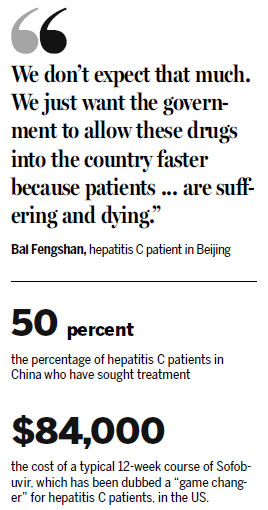Rising rate of infection
According to Lei Zhenglong, deputy head of disease prevention and control at the National Health and Family Planning Commission, the rates for hepatitis A and B are falling, but the incidence of hepatitis C is rising steadily.
Most cases of hepatitis C in China are the result of exposure to infected blood in situations such as transfusions, dental services and surgeries, and many patients were infected at registered medical facilities, he said.
According to Wei, experts estimate that fewer than 10 percent of hepatitis C cases in China have been detected, and less than 50 percent of those diagnosed with the virus have sought treatment.
The susceptible population includes people who had blood transfusions or organ transplants before 1992, plus individuals whose mother tested positive for the virus, he said, citing the official standards for screening and management set by the National Health and Family Planning Commission.
According to Bai from Beijing, patients in Shanghai who were infected via blood transfusions are now given one-time compensation of 60,000 yuan.
"The issue of saving lives is more urgent now because of a rise in the number of patients who lack the financial resources to buy drugs from overseas," he said.
Wei echoed that view: "The nation's hepatitis C patients cannot be reliant on drug-purchasing agencies."
The practice of purchasing drugs overseas is not a universal panacea, though, and has resulted in a number of problems. For example, patients buy drugs from a variety of outlets overseas, which makes it difficult for physicians to correctly gauge the effectiveness of their treatment and adjust their medication accordingly. Sometimes, patients even bought wrong medication, and overseas purchases also make it difficult to track the development of the disease, according to Wei.
"There is also an international dimension. The need to buy drugs from overseas tarnishes China's international image as an economic power if the basic medical needs of its citizens remain unmet," he said.
However, the authorities are working to make new treatments available, and Wei and his team are building an online hepatitis C virtual community to improve levels of care and facilitate accurate tracking of each patient's medication.
Furthermore, when patients key in their medical information in Chinese, the system will automatically produce an English-language version of their medical records and ailments.
"That would be helpful if our patients want to seek treatment and drugs overseas," Wei said. "What else is a good hepatitis C doctor to do?"
Wei also said that national drug authority has put DAA as priority, seeking breakthrough in management and technical. It might be of help for DAA to get approval soon.
Contact the writer at shanjuan@chinadaily.com.cn

